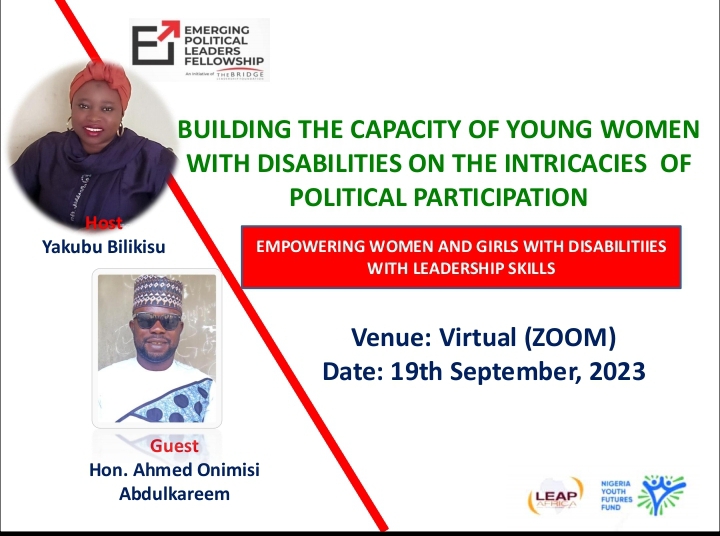A Civic Engagement Activity by Bilikisu Yakubu, 2023 EPLF Cohort Fellow
In fulfillment of the Fellowship’s commitment to Civic Engagement and with invaluable support from LEAP Africa and the Nigeria Youth Futures Fund, Bilikisu Yakubu, a 2023 Cohort EPLF Fellow, orchestrated a monumental Civic Engagement Activity on September 19, 2023. This activity was meticulously crafted to facilitate a deep and dynamic dialogue, focusing on “Capacity Building of Young Women and Girls with Disabilities on the Intricacies of Political Participation.”
The primary objectives of providing training to young women with disabilities in the realm of political participation were as follows:
- To empower them to play an active role in shaping their communities and society at large.
- To advance inclusivity in the political sphere by equipping young women with disabilities with the knowledge and tools necessary for full participation in political processes.
- To endow young women with disabilities with the essential skills to advocate for their own rights and the rights of others with disabilities, especially within the political arena.
- To nurture leadership skills among young women with disabilities, enabling them to assume leadership roles within their communities and in broader society.
- To promote diversity in political leadership by encouraging the active involvement of young women with disabilities in politics, thus bringing their unique perspectives and experiences to the forefront.
- To increase the engagement of young women with disabilities in political processes, ensuring that their voices are not only heard but also that their needs and concerns are effectively addressed.
Key Outcomes
Following the Civic Engagement Activity, the participants demonstrated remarkable outcomes. They developed a comprehensive understanding of leadership skills, with five individuals committing to assume leadership roles in various communities. Additionally, six participants pledged to organize Training of the Trainers (TOT) sessions within their diverse self-help groups at the local level, and three participants expressed their determination to actively engage in local politics. Furthermore, six participants agreed to advocate for inclusivity by engaging community leaders in discussions about the importance of creating an inclusive environment for young women and girls with disabilities, thereby enhancing their involvement in politics. In sum, this civic engagement initiative not only fostered empowerment for political participation but also deepened their comprehension of leadership development skills.
Recommendations
Political parties and governments must proactively promote the inclusion of persons with disabilities in the political arena by reserving a dedicated percentage of representation for them. This action serves as a vital step towards ensuring equal participation and a more inclusive political landscape. Governments should institute and enforce policies that penalize political parties for failing to include persons with disabilities in their ranks, while simultaneously creating pathways for increased involvement of individuals with disabilities in the political process. The Independent National Electoral Commission (INEC) should prioritize training its ad hoc staff to facilitate the engagement of persons with disabilities in casting their votes during elections. Leveraging technology and equipping security personnel with standardized weaponry are crucial steps in averting potential threats or crises that may deter individuals with disabilities from exercising their voting rights. Furthermore, persons with disabilities can explore the option of forming a coalition and registering a political party with INEC, enabling them to actively and fully participate in the political landscape.
Next Steps
Following the empowering capacity-building training, these young women took proactive steps to broaden their knowledge and engage in leadership activities in their respective communities. They have also made a collective commitment to join various political parties, actively participating to ensure the amplification of their voices and concerns in the political arena. Additionally, they have initiated advocacy efforts, including visits to traditional rulers and influential political figures, to garner support and advocate for the inclusion and empowerment of women with disabilities in the political discourse.

